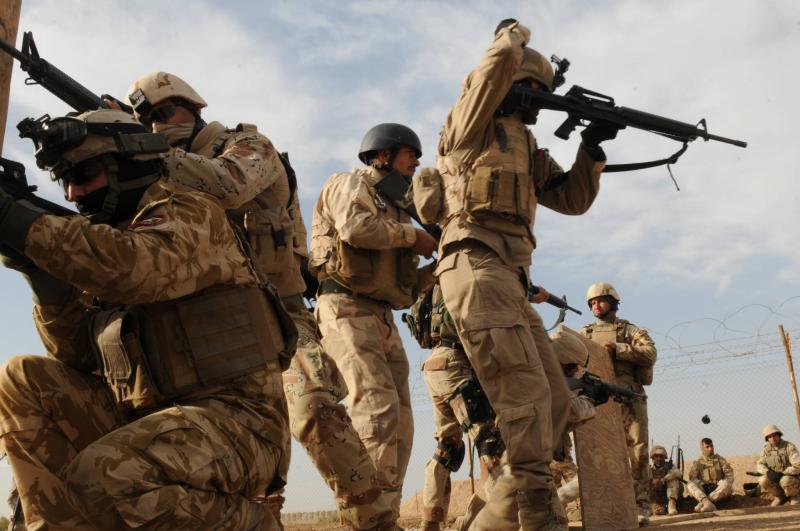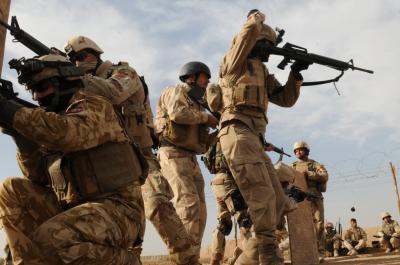The Iraqi Security Media Cell announced the launch of "Second Promise of Truth" operation, involving forces from the Ministries of Defense and Interior, the Popular Mobilization Forces, and the Counter-Terrorism Service, supported by the air force. The statement from the media cell indicated that this operation "comes based on intelligence to exert pressure on terrorist units and purify the desert of their remnants, reaching the international borders in coordination with border forces." The statement clarified that "the security forces have identified their targets at this stage and have devised plans to eliminate the remaining elements of ISIS terrorist gangs and destroy their empty dens."
In a similar statement, the commander of Al Anbar Operations for the Popular Mobilization Forces, Qassem Musleh, claimed that the operation is "the largest among the military operations launched by Iraqi forces in the western desert." He added that it "was launched to thwart terrorist plots in Al Anbar... to enhance security and stability and to pursue the remnants of ISIS terrorists," explaining that "the operation was implemented following intelligence indicating movements of ISIS terrorist gangs in the form of cells aimed at creating turmoil in Al Anbar."
Musleh stated that "the operation was launched under the supervision and planning of the Joint Operations Command, with the participation of Al Anbar Operations leaders and the leadership of the Popular Mobilization Forces in Al Anbar, along with the Mid-Euphrates Operations Command and affiliated units, including the army."
This operation comes at a time when there are conflicting statements from Iraqi officials regarding the near withdrawal of the international coalition forces from Iraq, especially the United States, which has the largest presence, while representatives of the coalition have not mentioned a withdrawal clause. The Chief of Staff of the Iraqi army, Lieutenant General Abdul Amir Rashid Yar Allah, confirmed that meetings of the high military committee to conclude the international coalition's mission in Iraq are ongoing.
The Iraqi News Agency reported Yar Allah as saying that a visit by a senior Iraqi military delegation to Washington in 2023 "discussed many issues, including the file to conclude the international coalition's mission in Iraq," explaining that "the gist of the statement was the agreement to form a high committee from Iraq and a high committee from the coalition forces tasked with ending the international coalition mission with timelines."
He noted that "the commander-in-chief of the armed forces ordered, following our return from Washington, the formation of the high committee led by me and consisting of several officers, and that the committee was purely military, while from the coalition a committee was formed under the leadership of the commander of the U.S. Central Command."
The Iraqi delegation included the Chief of Staff, the Minister of Defense, the Deputy Commander of Joint Operations, the head of the Counter-Terrorism Service, and the Chief of Staff of the Peshmerga. According to Yar Allah, "three committees were formed after the first session chaired by the commander-in-chief of the armed forces; the first relates to assessing ISIS, the second concerns the operational environment, and the third revolves around the capabilities of the Iraqi security forces." He added, "We, on the Iraqi side, formed the committees which were the ISIS Assessment Committee, the Operational Environment Committee, and the Capabilities Committee."
He indicated that "the second committee meeting was held last week and will occur every 15 days," emphasizing that "the meetings are ongoing and proceeding smoothly towards determining the timelines for concluding the coalition's mission in Iraq." Yar Allah revealed what he called "a seriousness we sensed in the meetings from the international coalition and a responsiveness from the coalition regarding our requirements and what we need from them."
Regarding the tasks of the international coalition, Yar Allah stated that "the international coalition's tasks are now limited to air support, and it does not have any military forces on the ground; this work is exclusively the responsibility of our security forces, including the army, Popular Mobilization Forces, Counter-Terrorism Service, and federal police." He clarified that "discussions with the international coalition focus on air and intelligence aspects, while on the ground, we are capable of performing our tasks and do not need any forces for support."
He stressed that "the Iraqi vision is to completely end the coalition's mission and set a timeline for its complete end while transitioning to a phase of bilateral partnership according to memorandums of understanding between the Iraqi Ministry of Defense and several coalition countries."




